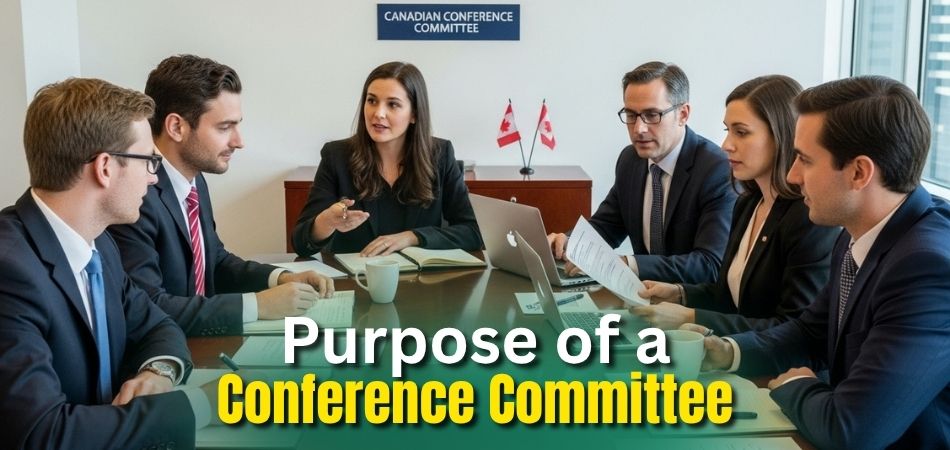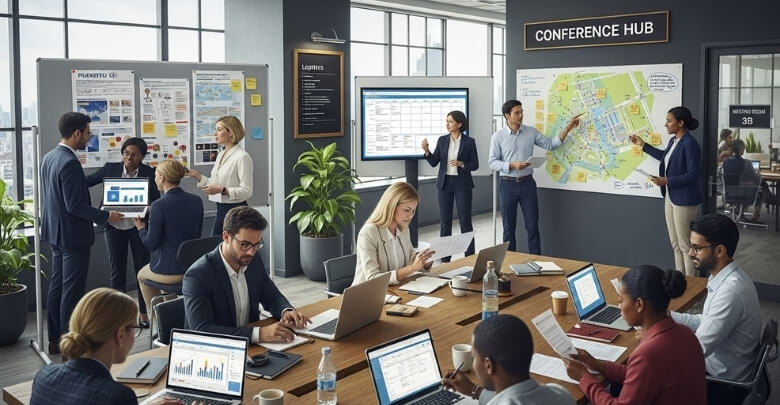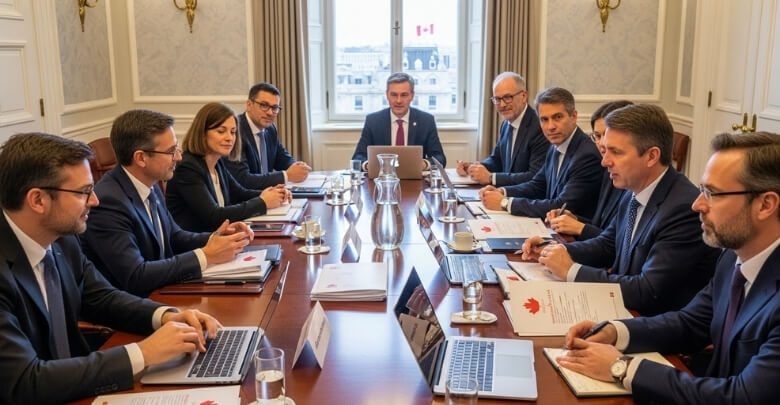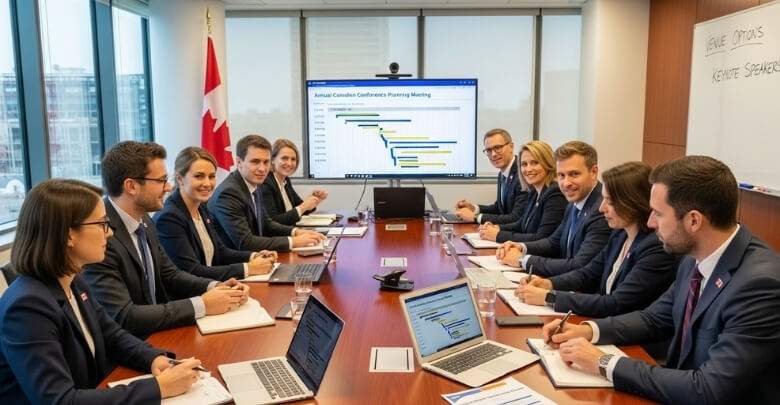A conference committee plays a vital role in bringing people and ideas together. Whether it’s for a professional event, an academic gathering, or even shaping laws, these committees are designed to make processes smoother and more effective. They handle key responsibilities, ensure things run on time, and work as a bridge to solve differences.
So, what is the purpose of a conference committee?
The purpose of a conference committee is to plan and manage a conference or help resolve differences in laws. In events, the committee handles things like speakers, places, and timing to make the event run well. In government, it helps fix differences in a bill so it can become law.
Keep reading as we break this down further and explore why their role matters.
What is the Purpose of a Conference Committee?
Conferences bring people together to share knowledge, solve issues, and set future directions. A conference committee ensures that everything flows smoothly and achieves the goals set by organizers. Their work touches planning, management, and even legal processes when dealing with government bills. Here are the main purposes of the committee.
Planning and Coordination
- Every committee takes charge of aligning ideas, plans, and resources, making sure all activities connect with set objectives.
- They carefully review schedules, themes, and resources, allowing smooth interaction between organizers, guests, and key decision-making participants.
- Leaders collaborate to assign responsibilities, monitor deadlines, and confirm no important details slip away during busy preparations.
Speaker and Program Management
- Committees evaluate speaker profiles, ensuring chosen experts inspire participants while also matching the theme and audience’s expectations.
- They coordinate session structures, allocate enough time, and arrange discussions that encourage engagement among delegates and presenters.
- Organizers balance diverse voices, adding both professional specialists and new thinkers to create dynamic, well-rounded knowledge-sharing environments.
Venue and Logistics Oversight
- Venue selection focuses on accessibility, safety, and convenience, ensuring every participant feels comfortable throughout the event.
- Organizers inspect seating, lighting, and technical facilities, ensuring presentations flow without interruptions and guests remain engaged.
- Logistical checks cover catering, equipment, and mobility services, guaranteeing all conference needs are met with care.
Budgeting and Financial Guidance
- Committees draft budgets, allocating resources wisely while ensuring financial commitments reflect the conference’s long-term goals.
- They monitor expenses, verify funding sources, and balance incoming revenues against planned costs throughout every planning stage.
- Financial oversight ensures transparency, protects credibility, and builds trust among sponsors, participants, and organizing bodies working together.
Problem-Solving and Conflict Resolution
- When disputes arise, committees evaluate perspectives, fostering solutions that satisfy diverse groups and sustain progress.
- They mediate disagreements by creating balanced compromises, ensuring smooth continuation of both planning and execution.
- Conflict resolution strategies focus on cooperation, communication, and fairness, which help maintain the conference’s professional environment.
Government and Policy Role
- In politics, committees reconcile different legislative drafts, ensuring bills proceed smoothly toward approval without contradictions.
- They examine disagreements between legislative houses, offering amendments that align laws with broader national policy goals.
- Their actions maintain legislative efficiency, preventing unnecessary delays that often disrupt governance and essential decision-making processes.
Enhancing Global Conference Impact
- Committees consider cultural differences, tailoring events for international delegates from countries like Canada, Germany, and Japan.
- For instance, planning a conference in Canada reflects strong hospitality standards, just like Australia or the United States.
- Global conferences build stronger networks, promote inclusivity, and expand collaborative opportunities across industries and international communities.
Ensuring Memorable Experiences
- Beyond logistics, committees design programs that spark inspiration, ensuring participants remember key lessons years afterward.
- They emphasize social events, networking opportunities, and collaborative workshops that support meaningful and long-lasting partnerships.
- Attention to detail in experiences encourages repeat attendance, increasing the credibility and reputation of the organizing body significantly.
Key Responsibilities of a Conference Committee
Every big event always needs a team that works behind the scenes to make everything successful. These people stay busy before, during, and even after the event to keep things running smoothly. Their jobs are different, but each task makes the event better. These are the main responsibilities of a conference committee.
Planning and Coordination
The first big responsibility is planning everything from the beginning. The committee sets clear goals and picks a theme that suits the audience. They also choose the best dates and book a proper venue for the event. Speakers, sponsors, and vendors are contacted early to avoid confusion later.
Program Development
A conference is meaningful only when the program is well-designed. The committee prepares sessions, workshops, and panels that match the main theme. They invite expert speakers who bring value and engage the audience. Each session is created with the participants’ interests in mind.
Logistics and Operations
Handling logistics is one of the most detailed jobs. The committee looks after registrations, transportation, and food arrangements. They also check sound, lighting, and internet so everyone enjoys without facing technical problems. Safety measures and emergency steps are also prepared carefully.
Marketing and Promotion
To make people attend, the committee promotes the event in many ways. They create posters, posts, and other creative materials. Social media, websites, and email are used to spread information widely. Good marketing also helps attract sponsors who support the event.
Financial Management
Money matters are always important in conferences. The committee prepares the budget and makes sure funds are used wisely. Sponsors and partners are contacted to support the event financially. They also track expenses and look for ways to save costs.
On-site Execution
When the event day comes, the committee works extra hard. They manage registrations, check-ins, and help participants settle. If unexpected problems happen, they find quick solutions without delay. Their main goal is to make sure everyone feels welcome.
Post-event Follow-up
The work doesn’t stop after the event ends. The committee collects feedback from participants to learn what went well. They also share slides, notes, or recordings with attendees for future use. Staying connected with participants builds long-term relationships for upcoming events.
Different Types of Conference Committees
Every big conference needs different teams to handle specific tasks smoothly. These groups divide responsibilities, focus on details, and ensure everything works well. Subcommittees help reduce stress on one group by sharing work equally. Here are the types of committees for your understanding.
Program Committee
This group designs the entire program carefully and selects themes suitable for both speakers and the audience. They prepare workshops, panel discussions, and create engaging sessions. Members also invite experts with knowledge matching the audience’s interests. Their focus ensures content remains valuable throughout.
Finance Committee
Money management becomes very important when hosting a conference. The finance committee handles budgets, expenses, and keeps track of sponsorship support. They also negotiate contracts while looking for cost-saving opportunities. Their main role is making sure resources are used wisely.
Logistics Committee
Practical arrangements often determine how successful an event feels for attendees. This committee organizes transportation, accommodation, food services, and technology requirements. Safety steps and emergency preparedness are always part of their responsibility. They make sure every small operational detail works correctly.
Publicity Committee
Promotion brings participants and sponsors together at the conference. The publicity team spreads awareness through posters, media, and online channels. Their efforts build excitement and attract people from different places. Good marketing strategies keep audiences engaged and increase attendance significantly.
Sponsorship Committee
This team reaches out to businesses, organizations, and individuals who might support the event financially. They design packages that benefit both sides. Sponsors get recognition, while organizers receive funds for essential needs. Sponsorships create stronger support for future conferences and activities.
Membership and Volunteer Team
Some committees also manage volunteers who help participants during events. Here, discussions sometimes involve the number of members in a conference committee because workloads differ. Volunteers support registration, guidance, and technical needs during the event. Their energy adds a welcoming atmosphere everywhere.
Why is a Conference Committee Important for Event Success?
Big events always demand careful planning and teamwork to succeed. A single person cannot manage all responsibilities effectively. That is where a conference committee comes in, making sure every part of the event gets proper attention. Here’s why they’re important for the event.
Smooth Planning
- Committees help align schedules, resources, and people, which keeps everything clear and prevents sudden confusion during the event.
- Careful planning through teamwork allows organizers to control tasks easily and handle unexpected issues without unnecessary stress.
Shared Workload
- Dividing duties among different members reduces pressure on individuals, making the overall work easier and less stressful.
- Every responsibility gets proper attention when shared equally, ensuring that no detail remains overlooked or handled without care.
Diverse Expertise
- Committees bring members with different skills, allowing events to gain better decisions from multiple perspectives and backgrounds.
- Experts from various fields ensure topics, logistics, and finances are managed thoughtfully, improving the entire conference experience greatly.
Efficient Operations
- Teams manage registrations, logistics, and programs together, which ensures everything happens quickly and reduces unnecessary time delays.
- Efficient teamwork keeps the event flowing smoothly, making both attendees and speakers feel comfortable throughout the sessions.
Stronger Decision-Making
- Group discussions allow better choices because multiple viewpoints highlight issues that a single person might easily miss.
- Committees create balanced decisions through cooperation, which improves fairness and prevents one-sided judgments during conference planning.
Better Communication
- Clear roles within committees make communication easier, helping members coordinate tasks without confusion or repeating instructions unnecessarily.
- Good communication ensures participants, sponsors, and speakers always understand updates, which builds trust and avoids misunderstandings.
Enhanced Attendee Experience
- Committees design engaging programs, arrange networking opportunities, and ensure every attendee feels included during conference sessions.
- By focusing on details like seating, food, and technical needs, committees improve comfort and overall participant satisfaction.
Problem Handling
- Unexpected issues can appear anytime, but committees solve them quickly, using teamwork to reduce impact and stress effectively.
- Shared responsibility means more solutions are available, which helps keep the event running without major interruptions or delays.
How Are Members Selected for a Conference Committee?
Every event needs a team that can plan and manage things well. Choosing members for this team is never random. It takes careful thought because the right people bring the right results. Without a proper selection, events may not succeed as expected. Here are the qualities organizers look for during selection.
Relevant Experience
People with past event experience are usually chosen first. They understand the challenges and know how to solve them quickly. Experienced members help guide new members with practical advice. Their knowledge makes the entire planning process smoother and more reliable.
Specific Skills
Skills are important when selecting committee members. Someone good at finance will be perfect for budget management tasks. A creative person can handle publicity and marketing. These skills ensure every part of the conference gets proper attention.
Strong Commitment
Events take time and energy, so commitment matters a lot. Members need to be ready for long hours. They should show interest and be consistent in their efforts. Dedicated people keep the conference planning steady from start to finish.
Balanced Representation
Diversity in committees helps bring fresh ideas. Members may represent different schools, organizations, or professional backgrounds. Balanced groups avoid bias and allow fairer decisions. A mix of people helps build a well-rounded and engaging event program.
Understanding Roles
Before joining, members must understand their roles clearly. Confusion can affect planning and waste valuable time. By knowing responsibilities, members stay more focused. This is why the responsibilities of a conference committee are always explained during selection.
Teamwork Ability
Working together is essential for committees. Selection often considers how well a person can cooperate with others. Team players make discussions smoother and reduce conflicts. Strong teamwork skills keep the group moving in one direction.
Leadership Potential
Some members may need to lead small groups or tasks. Leaders help keep everyone organized and motivated. Selection looks for people who can take charge when required. Leadership adds strength to the committee’s overall functioning.
Challenges Faced by Conference Committees
Organizing a conference is never a simple task because it requires constant effort, smart planning, and teamwork. Committees often face unexpected difficulties that test their patience and skills. These challenges can slow down progress if not handled properly. Understanding them helps in finding better solutions ahead.
- Time Management: Handling multiple schedules together becomes stressful because deadlines keep overlapping and important work sometimes gets delayed unnecessarily. Organizers often sacrifice personal time while juggling urgent matters and must carefully plan to complete everything on time.
- Budget Limits: Money often creates restrictions because committees must manage funds carefully without affecting important arrangements. Teams need to negotiate contracts wisely while looking for sponsors and saving wherever possible.
- Communication Gaps: Misunderstandings happen when members don’t share updates clearly and this causes problems in coordination. Regular meetings and effective tools help committees avoid confusion and ensure smooth information flow.
- Balancing Responsibilities: Committees usually handle several tasks at once and this leads to stress. Sharing duties fairly among members allows everyone to focus better and reduces mistakes.
- Unexpected Issues: Last-minute cancellations, technical problems, or weather changes can disrupt events quickly. Committees must think fast and act smartly to solve problems without creating bigger troubles.
- Coordination Trouble: Working with vendors, speakers, and sponsors sometimes creates delays or mismatches. Teams must stay flexible and adjust quickly to unexpected changes without losing confidence.
- Limited Resources: Some committees don’t get enough volunteers or materials to manage everything. They need creative ways to use available resources and complete all arrangements successfully.
Tips for Running an Effective Conference Committee
Every conference needs teamwork to run smoothly and leave a good impression. A group working without proper planning often struggles. Organizing a committee takes discipline, communication, and effort from everyone. Without this, events can feel messy and confusing for participants.
Clear Roles
When every member knows their exact role, things become easier. A finance head handles money while a program head arranges sessions. Dividing responsibilities avoids overlap and mistakes. Clear roles make members feel confident about their part in the event.
Regular Meetings
Meeting often keeps everyone updated about progress. It allows members to raise questions and solve problems before they grow bigger. Short meetings save time and still keep the work on track. Regular discussions also build stronger cooperation within the committee.
Open Communication
Communication is the heart of any team. Members must share updates honestly so nobody feels left out or confused. Using simple tools like group chats helps keep information clear. When people talk openly, mistakes reduce and trust increases.
Team Cooperation
Working together brings better results than working alone. Committee members should support each other when tasks feel heavy or stressful. Cooperation makes planning faster and smoother. A united team creates a conference that feels professional and well-organized.
Time Discipline
Events have deadlines that cannot be missed. Members should finish tasks on time so nothing gets delayed for others. Simple schedules and reminders help everyone stay on track. Time discipline ensures the whole conference runs smoothly without last-minute stress.
Problem Solving
Unexpected issues will always appear during planning. A good committee reacts quickly instead of wasting time blaming each other. Members should think calmly and find workable solutions. Fast problem-solving keeps the event on track without major delays.
Positive Attitude
Good energy matters when working in groups. Members who stay cheerful and helpful encourage others to keep going. Positive people reduce stress and make meetings enjoyable. A happy team usually creates an enjoyable experience for everyone at the event.
FAQs About the Purpose of a Conference Committee
Conference committees play a key role in shaping successful events and ensuring smooth organization. People often wonder about different aspects of their purpose. Here are some common questions and answers that bring clarity to their importance.
How Does a Conference Committee Improve Attendee Engagement?
A conference committee improves attendee engagement by planning interactive programs, choosing relevant topics, and organizing networking opportunities. Their work ensures participants feel included and motivated. Engaged attendees gain more value, creating a lasting impression and encouraging future conference participation.
Why Do Conference Committees Involve Multiple Subcommittees?
Conference committees involve multiple subcommittees to divide responsibilities into smaller, manageable parts. Each subcommittee specializes in areas like logistics, finance, or marketing. This division makes the planning process efficient, reduces stress, and ensures that all critical areas receive proper focus.
How Do Conference Committees Support Speakers?
Conference committees support speakers by arranging schedules, preparing resources, and providing necessary technical equipment. They also ensure speakers have clear instructions and comfortable environments. With such preparation, speakers deliver effectively, and audiences enjoy organized presentations without unnecessary interruptions or delays.
What Role Do Conference Committees Play in Building Partnerships?
Conference committees build partnerships by connecting with sponsors, organizations, and communities. They design benefits for partners while securing financial or resource support. These partnerships strengthen events, enhance credibility, and help build networks that support both immediate and long-term conference goals.
How Do Conference Committees Ensure Inclusivity?
Conference committees ensure inclusivity by considering diverse audiences and making arrangements for accessibility. They invite varied speakers, cover broad topics, and provide equal opportunities. Inclusive planning helps everyone feel valued, ensuring the event represents many perspectives and interests equally.
Why Do Conference Committees Focus on Feedback Collection?
Feedback collection helps committees measure event success and identify improvement areas. They distribute surveys, gather opinions, and analyze responses. With honest feedback, committees learn what worked and what needs better attention, ensuring future conferences grow stronger and more impactful.
How Do Conference Committees Handle Risk Management?
Conference committees handle risk management by preparing backup plans for unexpected issues. They consider problems like technical failures, safety concerns, or sudden cancellations. By staying prepared, they reduce risks and keep the event running smoothly even under difficult circumstances.
Why Is Evaluation an Ongoing Purpose of a Conference Committee?
Evaluation remains an ongoing purpose because committees must continually review decisions, actions, and results. It ensures accountability and improvement. Evaluations highlight strengths while addressing weaknesses, allowing future events to become more effective, efficient, and enjoyable for participants and organizers.
Last Words
A conference committee makes sure that everything at an event runs well. They plan the schedule, manage money, and solve problems quickly. The real answer to what is the purpose of a conference committee is simple: they keep work organized and fair.
Members share duties, help each other, and make sure every part of the event is covered. They also create a friendly space where guests and speakers feel comfortable. By focusing on teamwork and details, the committee turns big challenges into smooth results. With their support, any conference can be successful, enjoyable, and remembered.









